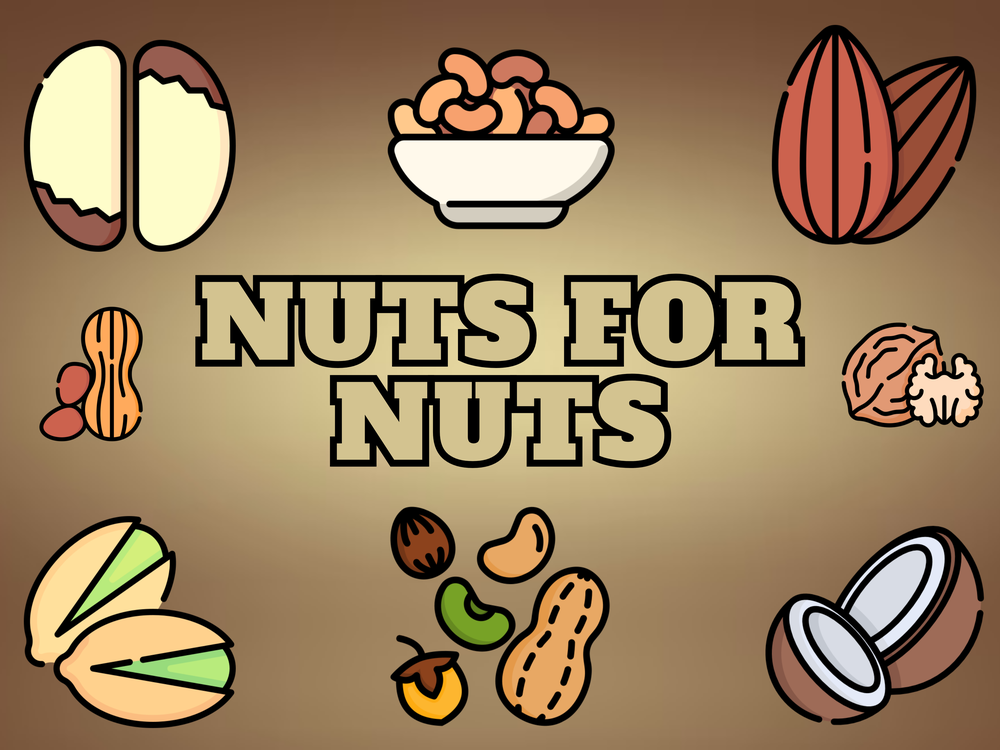
Introduction
I've been wanting to break down different foods in many common food groups for a while now, and now is finally time for the second part. Nuts, along with seeds, are nutrient power houses, being chock full (pun intended) of healthy fats, fiber, vitamins, and minerals. I will be listing various types of nuts, along with a minor description of the product, any health benefits or drawbacks, and a simple nutrition facts panel per serving size.
You really can't go wrong with nuts. Nutritionally, they're all very similar, with some scoring better in some aspects than others. Thankfully, serving sizes are very simple here; each nut has a standard serving size of 1 oz (28 g). So let's get into the list before we start going nuts.
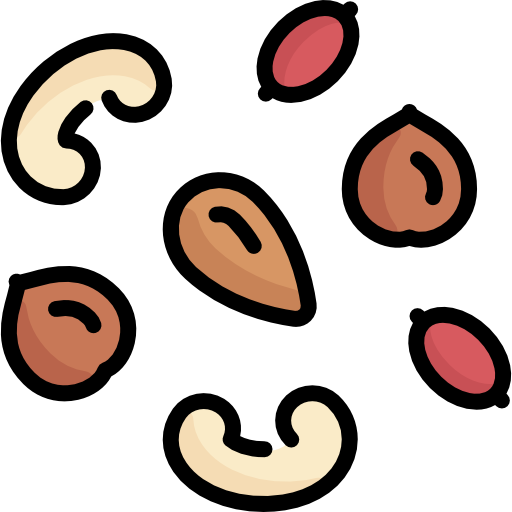
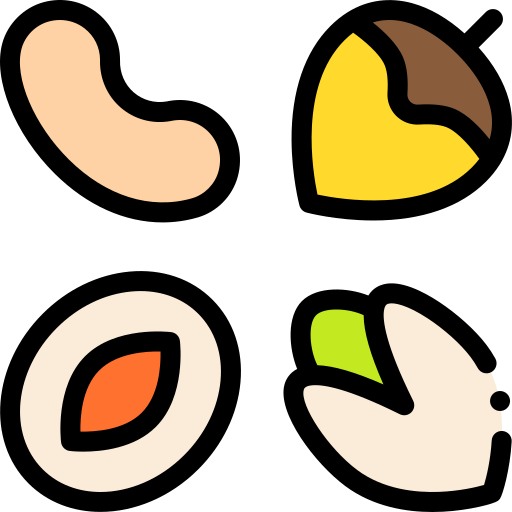
Other Posts in this Series


Contents
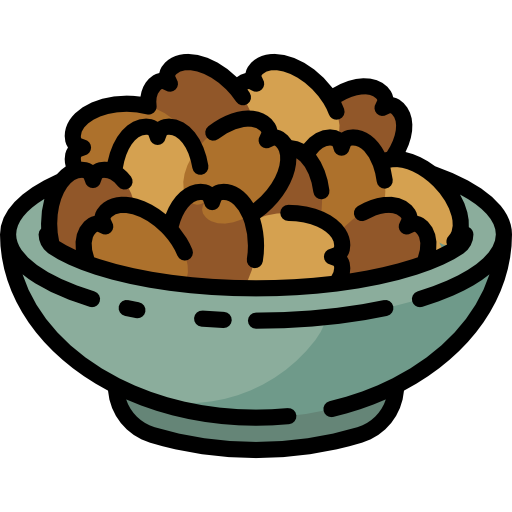
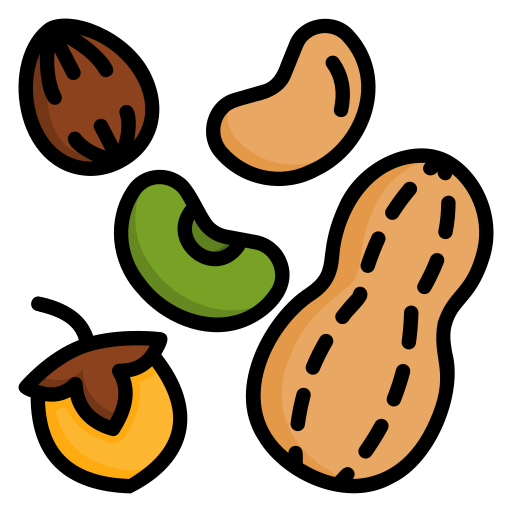
Almonds are a nutrient-dense tree nut packed with healthy fats, protein, fiber, vitamins, and minerals. Most notably, they are an excellent source of vitamin E, an antioxidant that supports skin health and immune function. Besides this, almonds are also a rich source of riboflavin, copper, magnesium, manganese, and phosphorus.
Additionally, almonds provide heart-healthy monounsaturated fats, which can help lower LDL ('bad') cholesterol and reduce the risk of heart disease. With their high fiber and protein content, almonds also promote satiety and help regulate blood sugar levels.
And don't forget about almond butter, which is delicious both plain and as my Chocolate Almond Butter. Almond butter is fantastic in my Almond Butter Date Brownies and Chocolate Chip Date Cookies, but you can swap peanut butter for almond butter in anything sweet to great success. I also like almond butter in my Air Fryer Falafel and 'Cheesy' Garlic Hummus as an oil substitute, providing healthy fats for less calories and more nutrients.
Serving Size: 1 oz (28 g)

Brazil nuts are tree nuts best known for containing stupid high amounts of the mineral selenium, where just 1 oz of Brazil nuts contains 986% the recommended daily intake of the mineral. Selenium is important in supporting thyroid function and immune health, as well as serving as an antioxidant. Just one or two Brazil nuts can provide more than the daily recommended intake of selenium.
Like most other nuts, Brazil nuts are also rich in heart-healthy monounsaturated fats, magnesium, and copper, as well as phosphorus, manganese, and zinc. Additionally, Brazil nuts contain a bit of protein, fiber, thiamin, and vitamin E, and are also lower in carbs than most other nuts listed here. However, due to their high selenium levels, it's best to consume them in moderation to avoid toxicity.
Serving Size: 1 oz (28 g)
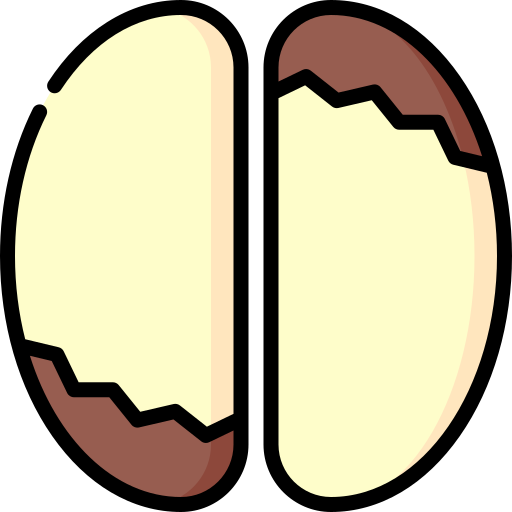
Cashews are a creamy, nutrient-rich tree nut packed with healthy fats, plant-based protein, and essential minerals. Compared to other nuts, cashews are a little bit lower in fat and calories, and instead contain slightly more carbs. Nutritionally, cashews contain a bit less than some other nuts, though they are still a good source of magnesium, manganese, phosphorus, and zinc. In particular, cashews are the best source on this list of copper, which plays a key role in energy production and immune function. Cashews also uniquely provide vitamin K, though they do contain less fiber than some other nuts.
Besides just snacking on the nuts, cashews are also often soaked and blended in order to mimic cheese and heavy cream in vegan dishes, like in my 'Mac' & 'Cheese' and Cheesy Cauliflower Rice & Beans. Cashew butter is also an excellent ingredient in sweet recipes, such as in my Edible Cookie Dough Bites and Double Chocolate Date Cookies, where the cashews act as a great creamy and sticky base without being overpowering. Cashews are also great for plain or flavored nut butters, like my Biscoff inspired Cashew Cookie Butter. You can even use cashew butter as an oil substitute like I do in many of my hummus recipes, such as Lemony Taco Inspired Hummus, which helps keep it creamy for less calories.
Serving Size: 1 oz (28 g)
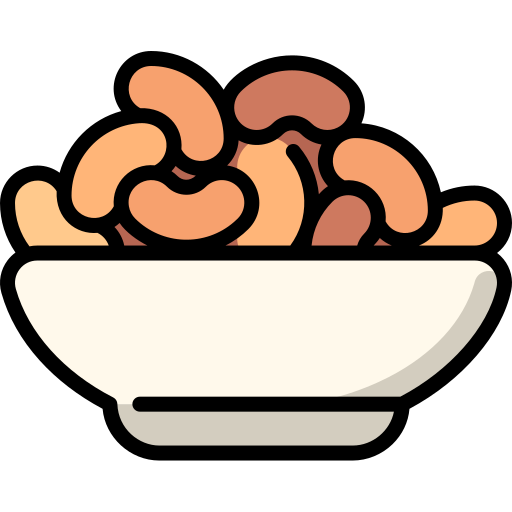
Chestnuts are a weird one. While they are considered tree nuts, chestnuts have less than half the calories per ounce than all other nuts. This is because they contain mostly carbs and almost no fat, unlike every other type of nut. Chestnuts are also just mediocre micronutritionally, though they do contain some vitamin C (8 %), while other nuts do not. They're still a decent snack, but not the nutrient powerhouses of the other nuts on this list.
Serving Size: 1 oz (28 g)
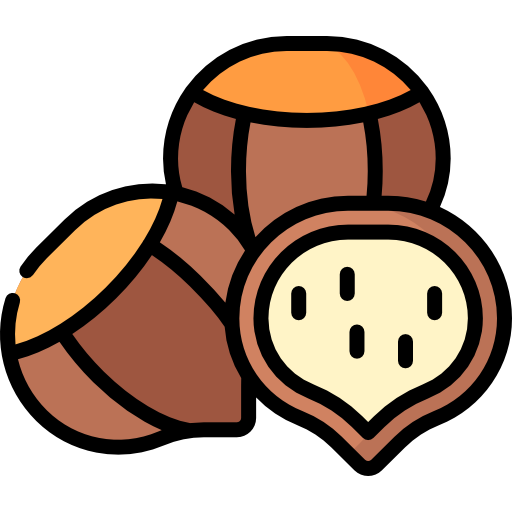
While coconut is technically a fruit and not a nut, it's more similar to nuts due to its high fat content, most of which being saturated fat. Per ounce, coconut is lower in fat than most items on this list, while also being midly sweet and containing a decent bit of fiber. Under the hood, coconut is a decent source of both copper and manganese, though it is lacking in most micronutrients when compared to other nuts.
If fat is having a redemption arch, it's coconut that's leading the charge. The saturated fat content in coconut is comprised of mainly Medium Chain Triglycerides (MCTs), which are shown to be burned for energy, similar to carbs, while not spiking blood sugar or stimulating insulin secretion. There's a reason why coconut oil is often used as a healthier butter. It may have the same fat and calories, but having the same calories doens't make them equivalent.
While I've never had a whole coconut (yet), there are a plethora of coconut products on the market. Some good for you, (like coconut flour and unsweetened coconut flakes), some in the middle (like coconut oil), and some bad for you (like sweetened coconut flakes and coconut sugar). You can use unsweetened coconut flakes in my 7-Layer Bars and No Bake Energy Bites, or coconut flour in my No Bake Cheesecake Bars and Gluten and Grain Free Coconut Bread, and even coconut oil in my Sugar Free Apple Pie and Sugar Free Chocolate Bar. Coconut is a very versatile ingredient; you can even turn it into a 'nut' butter substitute if you blend unsweetened coconut flakes.
Serving Size: 1 oz (28 g)

Hazelnuts, also known as filberts, are a very nutritious tree nut, being a great source of fiber and monounsaturated fats, which are known to be heart healthy in whole food sources. While not as much as almonds, hazelnuts are also a great source of vitamin E, as well as being very rich in the mineral manganese. Besides this, hazelnuts also contain a significant amounts of vitamins B1, B6, and B9, as well as copper and magnesium.
And no, nutella doesn't count as eating hazelnuts. More than half of it is sugar and a third of it is palm oil; only a measly 13% of nutella is actually hazelnuts. Check out my Roasted Hazelnut Nutella if you want a delicious hazelnut spread that has no added sugar or oils.
Serving Size: 1 oz (28 g)
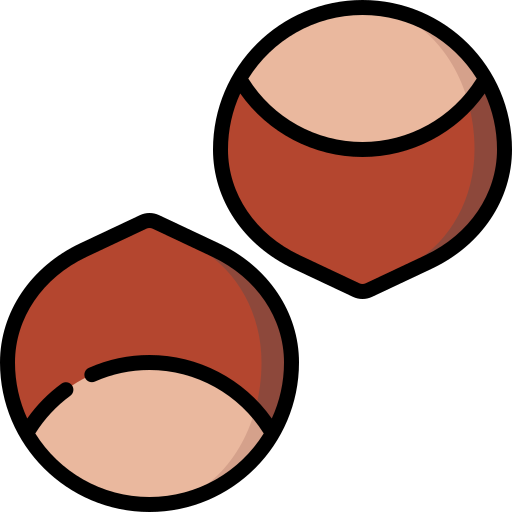
Macadamia nuts are sometimes referred to as the extra virgin olive oil of nuts, and for good reason. These tree nuts boast a whopping 17 grams of monounsaturated fat per serving, making them the best source of this heart healthy fat on the list. Macadamias are notably higher in fat and lower in carbs than most other nuts, leading it to have slightly more calories. Despite a lower carb content, they still contain a notable amount of fiber.
As for micronutrients, macadamia nuts are one of the best sources here for vitamin B1. Like most other nuts, macadamias are also a rich source of copper and manganese, as well as being a good source of antioxidants. Macadamia nuts are one of the healthiest nuts out there, and I would be eating them all the time if they weren't so damn expensive.
Serving Size: 1 oz (28 g)
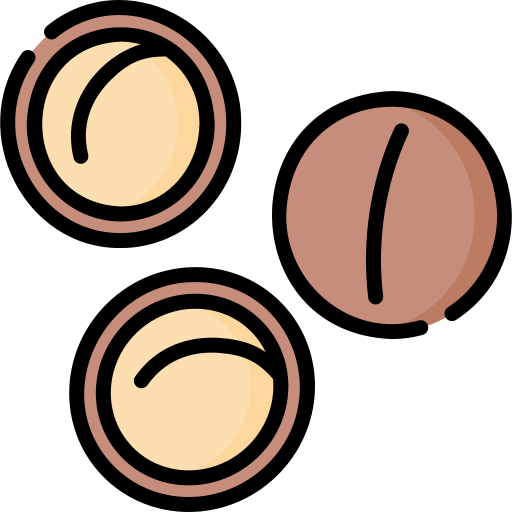
Ah peanuts, the old classic. Peanuts are the highest on this list in protein, and they also contain significant amounts of B vitamins, namely B1, B3, B5, and B9. Peanuts are also a good source of vitamin E, as well as copper, magnesium, and manganese. They're not stellar at any one thing in particular; instead, being a jack of all trades nut that's just pretty solid across the board. While peanuts are outshined nutritionally by most other nuts, they still are a cheap and nutritious addition to your diet.
Peanuts, while technically legumes, are basically the poor man's nut (perfect for Poor Man Protein). There's a reason why the term 'peanuts' is often used to describe something cheap; they're the cheapest nuts by far. I can find them for $2.48 per pound, half the price of most other nuts on this list.
If you know me, then you know that I'm in love with Natural Peanut Butter. With just nuts, salt, and food processor, you can create the best peanut butter you've ever had in only 5 minutes. Flavoring is optional, but I'm a big fan of Maple Cinnamon Peanut Butter. Just take a quick look at my site, and you'll see uses for peanuts and peanut butter all over the place. From sweet recipes like No Bake Homemade Tiramisu, Peanut Butter Fudge Bars, and Sweet Potato Banana Muffins, to savory recipes like Maafe (African Peanut Stew) and Nam Sod (Thai Pork Salad), there's no shortage of ways to incorporate peanuts into your diet. This goes without saying, but you should avoid peanuts if you have a nut allergy.
Serving Size: 1 oz (28 g)

Pecans, also known as pecans, are a higher fat and lower carb tree nut compared to the rest of the list. Despite only containing 4 grams of carbs for a 1 ounce serving, pecans still have 3 grams of fiber, making them low in net carbs. Pecans contain a significant amount of heart healthy monounsaturated fats, as well as vitamin B1, copper, manganese, and zinc. As long as they're not candied, pecans are a great addition to your diet, such as crushed on salads or blended into a pecan nut butter. Just like walnuts, peacans are soft enough that you can crush them with your fingers, making them easy to add on top of any dish without having to dirty a knife and cutting board.
Serving Size: 1 oz (28 g)
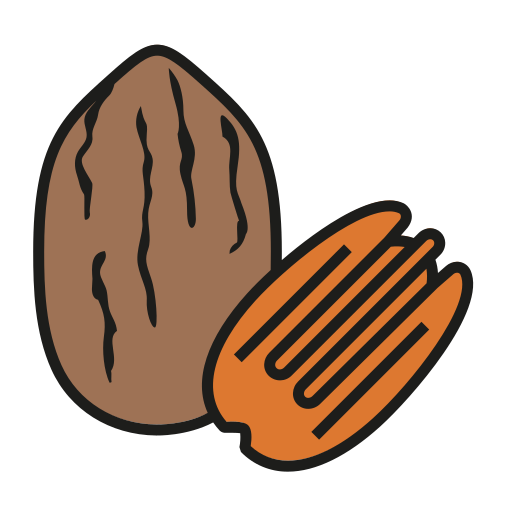
Pine nuts, also known as pignolis, are a nutritious but very expensive tree nut. They rival macadamia nuts in cost, sometimes being $10 for just half a pound. Pine nuts are a traditional ingredient in pesto; however, I typically swap them out for a cheaper nut, like almonds or walnuts, such as in my Creamy Pesto Dip, Lightened EVOO Pesto, and Oil Free Basil Pesto. While we're on the topic of pesto, spinach is a much cheaper substitute for basil. The more you know.
Okay, okay, back to pine nuts. Pine nuts contain a moderate amount of fiber and protein compared to some other nuts, but they make up for this with their very high concentration of manganese, the highest on this list. Additionally, pine nuts are a rich source of vitamin E, copper, mangesium, phosphorus, zinc, and even vitamin K. Besides pignoli cookies, when I think of pine nuts, I think of my mom's Lebanese Casserole with pine nuts, spinach, rice, and ground meat.
Serving Size: 1 oz (28 g)
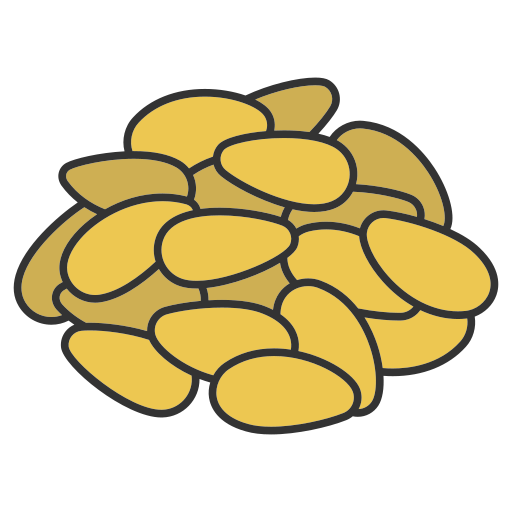
Pistachios are a delicious green tree nut that are also known for being quite expensive. I've sometimes seen $10 a pound for shell-on pistachios, where the shells account for half the weight of the bag. Of the more standard nuts though, this is definitely the most expensive. The one benefit of having the shell on means that it's harder to over-eat pistachios, as it's very easy to end up eating too many calories when snacking on nuts. Because of their green hue, they make a gorgeous nut butter, and you can even make Mint Pistachio Butter without any food dyes.
Compared to other nuts, pistachios are a bit lower in fat and calories, instead opting for a higher total carb and fiber content, while also being midly sweet. Pistachios also contain quite a decent amount of protein for nuts at 6 grams per 1 ounce (28 g) serving. While the mineral contents of pistachios are lower than other nuts, they uniquely contain a significant amounts of vitamin B6, the highest on this list, as well as quite a lot of thiamin.
Serving Size: 1 oz (28 g)

Finally, we've arrived at walnuts. While they are a slightly higher fat nut compared to others, mainly polyunsaturated fat, walnuts uniquely contain the Omega-3 fatty acid ALA. These tree nuts contain a moderate amount of fiber, protein, and B vitamins, and are quite high in copper and manganese. Walnuts are also known be anti-cancer and anti-inflammatory, due to its antioxidants and polyphenols.
What I really like about walnuts is that they are soft, just like pecans. I can crush them with my fingers and put them on top of my salads and yogurt without having to break out a knife and cutting board. Plus they make a great nut butter, both plain and White Chocolate Walnut Butter. I also like walnuts in my High Protein Veggie Ground for their slight crunch. Like almonds, walnuts are one of the few nuts that I prefer to eat both raw and unsalted.
Serving Size: 1 oz (28 g)
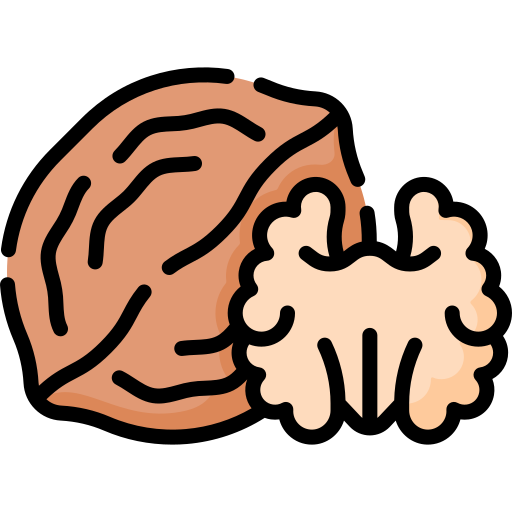
Nutritional Comparison
Scroll to the right to read information about every variation

References
This post may contain affiliate links
I've been wanting to break down different foods in many common food groups for a while now, and now is finally time for the second part. Nuts, along with seeds, are nutrient power houses, being chock full (pun intended) of healthy fats, fiber, vitamins, and minerals. I will be listing various types of nuts, along with a minor description of the product, any health benefits or drawbacks, and a simple nutrition facts panel per serving size.
You really can't go wrong with nuts. Nutritionally, they're all very similar, with some scoring better in some aspects than others. Thankfully, serving sizes are very simple here; each nut has a standard serving size of 1 oz (28 g). So let's get into the list before we start going nuts.


Other Posts in this Series
- Let's Meet The Meats
- I'm Nuts For Nuts
- I See Seeds In Your Future
- Beans Beans The Musical Fruit
- Going Bananas For Bananas
- Lettuce Turnip The Beet
- I'm Hooked On Fish
- A Grain Of Truth
- I'm Dying For Dairy


Contents
- Almonds
- Brazil Nuts
- Cashews
- Chestnuts
- Coconut
- Hazelnuts
- Macadamia Nuts
- Peanuts
- Pecans
- Pine Nuts
- Pistachios
- Walnuts
- Nutritional Comparison


Almonds are a nutrient-dense tree nut packed with healthy fats, protein, fiber, vitamins, and minerals. Most notably, they are an excellent source of vitamin E, an antioxidant that supports skin health and immune function. Besides this, almonds are also a rich source of riboflavin, copper, magnesium, manganese, and phosphorus.
Additionally, almonds provide heart-healthy monounsaturated fats, which can help lower LDL ('bad') cholesterol and reduce the risk of heart disease. With their high fiber and protein content, almonds also promote satiety and help regulate blood sugar levels.
And don't forget about almond butter, which is delicious both plain and as my Chocolate Almond Butter. Almond butter is fantastic in my Almond Butter Date Brownies and Chocolate Chip Date Cookies, but you can swap peanut butter for almond butter in anything sweet to great success. I also like almond butter in my Air Fryer Falafel and 'Cheesy' Garlic Hummus as an oil substitute, providing healthy fats for less calories and more nutrients.
------------------------------------------
Total Fat: 14.0g (18 %)
Total Carbohydrate: 6.0g (2 %)
Fiber: 3.5g (13 %)
Net Carbs: 2.5g
Protein: 5.9g (12 %)
Total Fat: 14.0g (18 %)
Total Carbohydrate: 6.0g (2 %)
Fiber: 3.5g (13 %)
Net Carbs: 2.5g
Protein: 5.9g (12 %)
------------------------------------------
Vitamin B1 (Thiamin): 0.06mg (5 %)
Vitamin E: 7.18mg (48 %)
------------------------------------------
Copper: 0.29mg (32 %)
Magnesium: 76mg (18 %)
Manganese: 0.61mg (27 %)
Potassium: 205mg (4 %)
------------------------------------------Vitamin B1 (Thiamin): 0.06mg (5 %)
Vitamin E: 7.18mg (48 %)
------------------------------------------
Copper: 0.29mg (32 %)
Magnesium: 76mg (18 %)
Manganese: 0.61mg (27 %)
Potassium: 205mg (4 %)

Brazil nuts are tree nuts best known for containing stupid high amounts of the mineral selenium, where just 1 oz of Brazil nuts contains 986% the recommended daily intake of the mineral. Selenium is important in supporting thyroid function and immune health, as well as serving as an antioxidant. Just one or two Brazil nuts can provide more than the daily recommended intake of selenium.
Like most other nuts, Brazil nuts are also rich in heart-healthy monounsaturated fats, magnesium, and copper, as well as phosphorus, manganese, and zinc. Additionally, Brazil nuts contain a bit of protein, fiber, thiamin, and vitamin E, and are also lower in carbs than most other nuts listed here. However, due to their high selenium levels, it's best to consume them in moderation to avoid toxicity.
------------------------------------------
Total Fat: 18.8g (24 %)
Total Carbohydrate: 3.3g (1 %)
Fiber: 2.1g (8 %)
Net Carbs: 1.2g
Protein: 4.0g (8 %)
Total Fat: 18.8g (24 %)
Total Carbohydrate: 3.3g (1 %)
Fiber: 2.1g (8 %)
Net Carbs: 1.2g
Protein: 4.0g (8 %)
------------------------------------------
Vitamin B1 (Thiamin): 0.17mg (14 %)
Vitamin E: 1.58mg (11 %)
------------------------------------------
Copper: 0.49mg (54 %)
Magnesium: 105mg (25 %)
Manganese: 0.34mg (15 %)
Potassium: 185mg (4 %)
------------------------------------------Vitamin B1 (Thiamin): 0.17mg (14 %)
Vitamin E: 1.58mg (11 %)
------------------------------------------
Copper: 0.49mg (54 %)
Magnesium: 105mg (25 %)
Manganese: 0.34mg (15 %)
Potassium: 185mg (4 %)

Cashews are a creamy, nutrient-rich tree nut packed with healthy fats, plant-based protein, and essential minerals. Compared to other nuts, cashews are a little bit lower in fat and calories, and instead contain slightly more carbs. Nutritionally, cashews contain a bit less than some other nuts, though they are still a good source of magnesium, manganese, phosphorus, and zinc. In particular, cashews are the best source on this list of copper, which plays a key role in energy production and immune function. Cashews also uniquely provide vitamin K, though they do contain less fiber than some other nuts.
Besides just snacking on the nuts, cashews are also often soaked and blended in order to mimic cheese and heavy cream in vegan dishes, like in my 'Mac' & 'Cheese' and Cheesy Cauliflower Rice & Beans. Cashew butter is also an excellent ingredient in sweet recipes, such as in my Edible Cookie Dough Bites and Double Chocolate Date Cookies, where the cashews act as a great creamy and sticky base without being overpowering. Cashews are also great for plain or flavored nut butters, like my Biscoff inspired Cashew Cookie Butter. You can even use cashew butter as an oil substitute like I do in many of my hummus recipes, such as Lemony Taco Inspired Hummus, which helps keep it creamy for less calories.
------------------------------------------
Total Fat: 12.3g (16 %)
Total Carbohydrate: 8.5g (3 %)
Fiber: 0.9g (3 %)
Net Carbs: 7.6g
Protein: 5.1g (10 %)
Total Fat: 12.3g (16 %)
Total Carbohydrate: 8.5g (3 %)
Fiber: 0.9g (3 %)
Net Carbs: 7.6g
Protein: 5.1g (10 %)
------------------------------------------
Vitamin B1 (Thiamin): 0.12mg (10 %)
Vitamin E: 0.25mg (2 %)
------------------------------------------
Copper: 0.61mg (68 %)
Magnesium: 82mg (20 %)
Manganese: 0.46mg (20 %)
Potassium: 185mg (4 %)
------------------------------------------Vitamin B1 (Thiamin): 0.12mg (10 %)
Vitamin E: 0.25mg (2 %)
------------------------------------------
Copper: 0.61mg (68 %)
Magnesium: 82mg (20 %)
Manganese: 0.46mg (20 %)
Potassium: 185mg (4 %)

Chestnuts are a weird one. While they are considered tree nuts, chestnuts have less than half the calories per ounce than all other nuts. This is because they contain mostly carbs and almost no fat, unlike every other type of nut. Chestnuts are also just mediocre micronutritionally, though they do contain some vitamin C (8 %), while other nuts do not. They're still a decent snack, but not the nutrient powerhouses of the other nuts on this list.
------------------------------------------
Total Fat: 0.6g (1 %)
Total Carbohydrate: 14.8g (5 %)
Fiber: 1.4g (5 %)
Net Carbs: 13.4g
Protein: 0.9g (2 %)
Total Fat: 0.6g (1 %)
Total Carbohydrate: 14.8g (5 %)
Fiber: 1.4g (5 %)
Net Carbs: 13.4g
Protein: 0.9g (2 %)
------------------------------------------
Vitamin B1 (Thiamin): 0.07mg (6 %)
Vitamin E: 0.14mg (1 %)
------------------------------------------
Copper: 0.14mg (16 %)
Magnesium: 9mg (2 %)
Manganese: 0.0mg (0 %)
Potassium: 166mg (4 %)
------------------------------------------Vitamin B1 (Thiamin): 0.07mg (6 %)
Vitamin E: 0.14mg (1 %)
------------------------------------------
Copper: 0.14mg (16 %)
Magnesium: 9mg (2 %)
Manganese: 0.0mg (0 %)
Potassium: 166mg (4 %)

While coconut is technically a fruit and not a nut, it's more similar to nuts due to its high fat content, most of which being saturated fat. Per ounce, coconut is lower in fat than most items on this list, while also being midly sweet and containing a decent bit of fiber. Under the hood, coconut is a decent source of both copper and manganese, though it is lacking in most micronutrients when compared to other nuts.
If fat is having a redemption arch, it's coconut that's leading the charge. The saturated fat content in coconut is comprised of mainly Medium Chain Triglycerides (MCTs), which are shown to be burned for energy, similar to carbs, while not spiking blood sugar or stimulating insulin secretion. There's a reason why coconut oil is often used as a healthier butter. It may have the same fat and calories, but having the same calories doens't make them equivalent.
While I've never had a whole coconut (yet), there are a plethora of coconut products on the market. Some good for you, (like coconut flour and unsweetened coconut flakes), some in the middle (like coconut oil), and some bad for you (like sweetened coconut flakes and coconut sugar). You can use unsweetened coconut flakes in my 7-Layer Bars and No Bake Energy Bites, or coconut flour in my No Bake Cheesecake Bars and Gluten and Grain Free Coconut Bread, and even coconut oil in my Sugar Free Apple Pie and Sugar Free Chocolate Bar. Coconut is a very versatile ingredient; you can even turn it into a 'nut' butter substitute if you blend unsweetened coconut flakes.
------------------------------------------
Total Fat: 9.4g (12 %)
Total Carbohydrate: 4.3g (2 %)
Fiber: 2.5g (9 %)
Net Carbs: 1.8g
Protein: 0.9g (2 %)
Total Fat: 9.4g (12 %)
Total Carbohydrate: 4.3g (2 %)
Fiber: 2.5g (9 %)
Net Carbs: 1.8g
Protein: 0.9g (2 %)
------------------------------------------
Vitamin B1 (Thiamin): 0.02mg (2 %)
Vitamin E: 0.07mg (1 %)
------------------------------------------
Copper: 0.12mg (13 %)
Magnesium: 9mg (2 %)
Manganese: 0.42mg (18 %)
Potassium: 100mg (2 %)
------------------------------------------Vitamin B1 (Thiamin): 0.02mg (2 %)
Vitamin E: 0.07mg (1 %)
------------------------------------------
Copper: 0.12mg (13 %)
Magnesium: 9mg (2 %)
Manganese: 0.42mg (18 %)
Potassium: 100mg (2 %)

Hazelnuts, also known as filberts, are a very nutritious tree nut, being a great source of fiber and monounsaturated fats, which are known to be heart healthy in whole food sources. While not as much as almonds, hazelnuts are also a great source of vitamin E, as well as being very rich in the mineral manganese. Besides this, hazelnuts also contain a significant amounts of vitamins B1, B6, and B9, as well as copper and magnesium.
And no, nutella doesn't count as eating hazelnuts. More than half of it is sugar and a third of it is palm oil; only a measly 13% of nutella is actually hazelnuts. Check out my Roasted Hazelnut Nutella if you want a delicious hazelnut spread that has no added sugar or oils.
------------------------------------------
Total Fat: 17.0g (22 %)
Total Carbohydrate: 4.7g (2 %)
Fiber: 2.7g (10 %)
Net Carbs: 2.0g
Protein: 4.2g (8 %)
Total Fat: 17.0g (22 %)
Total Carbohydrate: 4.7g (2 %)
Fiber: 2.7g (10 %)
Net Carbs: 2.0g
Protein: 4.2g (8 %)
------------------------------------------
Vitamin B1 (Thiamin): 0.18mg (15 %)
Vitamin E: 4.21mg (28 %)
------------------------------------------
Copper: 0.48mg (54 %)
Magnesium: 46mg (11 %)
Manganese: 1.73mg (75 %)
Potassium: 190mg (4 %)
------------------------------------------Vitamin B1 (Thiamin): 0.18mg (15 %)
Vitamin E: 4.21mg (28 %)
------------------------------------------
Copper: 0.48mg (54 %)
Magnesium: 46mg (11 %)
Manganese: 1.73mg (75 %)
Potassium: 190mg (4 %)

Macadamia nuts are sometimes referred to as the extra virgin olive oil of nuts, and for good reason. These tree nuts boast a whopping 17 grams of monounsaturated fat per serving, making them the best source of this heart healthy fat on the list. Macadamias are notably higher in fat and lower in carbs than most other nuts, leading it to have slightly more calories. Despite a lower carb content, they still contain a notable amount of fiber.
As for micronutrients, macadamia nuts are one of the best sources here for vitamin B1. Like most other nuts, macadamias are also a rich source of copper and manganese, as well as being a good source of antioxidants. Macadamia nuts are one of the healthiest nuts out there, and I would be eating them all the time if they weren't so damn expensive.
------------------------------------------
Total Fat: 21.2g (27 %)
Total Carbohydrate: 3.9g (1 %)
Fiber: 2.4g (9 %)
Net Carbs: 1.5g
Protein: 2.2g (4 %)
Total Fat: 21.2g (27 %)
Total Carbohydrate: 3.9g (1 %)
Fiber: 2.4g (9 %)
Net Carbs: 1.5g
Protein: 2.2g (4 %)
------------------------------------------
Vitamin B1 (Thiamin): 0.33mg (28 %)
Vitamin E: 0.15mg (1 %)
------------------------------------------
Copper: 0.21mg (24 %)
Magnesium: 36mg (9 %)
Manganese: 1.16mg (50 %)
Potassium: 103mg (2 %)
------------------------------------------Vitamin B1 (Thiamin): 0.33mg (28 %)
Vitamin E: 0.15mg (1 %)
------------------------------------------
Copper: 0.21mg (24 %)
Magnesium: 36mg (9 %)
Manganese: 1.16mg (50 %)
Potassium: 103mg (2 %)

Ah peanuts, the old classic. Peanuts are the highest on this list in protein, and they also contain significant amounts of B vitamins, namely B1, B3, B5, and B9. Peanuts are also a good source of vitamin E, as well as copper, magnesium, and manganese. They're not stellar at any one thing in particular; instead, being a jack of all trades nut that's just pretty solid across the board. While peanuts are outshined nutritionally by most other nuts, they still are a cheap and nutritious addition to your diet.
Peanuts, while technically legumes, are basically the poor man's nut (perfect for Poor Man Protein). There's a reason why the term 'peanuts' is often used to describe something cheap; they're the cheapest nuts by far. I can find them for $2.48 per pound, half the price of most other nuts on this list.
If you know me, then you know that I'm in love with Natural Peanut Butter. With just nuts, salt, and food processor, you can create the best peanut butter you've ever had in only 5 minutes. Flavoring is optional, but I'm a big fan of Maple Cinnamon Peanut Butter. Just take a quick look at my site, and you'll see uses for peanuts and peanut butter all over the place. From sweet recipes like No Bake Homemade Tiramisu, Peanut Butter Fudge Bars, and Sweet Potato Banana Muffins, to savory recipes like Maafe (African Peanut Stew) and Nam Sod (Thai Pork Salad), there's no shortage of ways to incorporate peanuts into your diet. This goes without saying, but you should avoid peanuts if you have a nut allergy.
------------------------------------------
Total Fat: 13.8g (18 %)
Total Carbohydrate: 4.5g (2 %)
Fiber: 2.4g (8 %)
Net Carbs: 2.1g
Protein: 7.2g (15 %)
Total Fat: 13.8g (18 %)
Total Carbohydrate: 4.5g (2 %)
Fiber: 2.4g (8 %)
Net Carbs: 2.1g
Protein: 7.2g (15 %)
------------------------------------------
Vitamin B1 (Thiamin): 0.18mg (15 %)
Vitamin E: 2.33mg (16 %)
------------------------------------------
Copper: 0.32mg (36 %)
Magnesium: 47mg (11 %)
Manganese: 0.54mg (24 %)
Potassium: 197mg (4 %)
------------------------------------------Vitamin B1 (Thiamin): 0.18mg (15 %)
Vitamin E: 2.33mg (16 %)
------------------------------------------
Copper: 0.32mg (36 %)
Magnesium: 47mg (11 %)
Manganese: 0.54mg (24 %)
Potassium: 197mg (4 %)

Pecans, also known as pecans, are a higher fat and lower carb tree nut compared to the rest of the list. Despite only containing 4 grams of carbs for a 1 ounce serving, pecans still have 3 grams of fiber, making them low in net carbs. Pecans contain a significant amount of heart healthy monounsaturated fats, as well as vitamin B1, copper, manganese, and zinc. As long as they're not candied, pecans are a great addition to your diet, such as crushed on salads or blended into a pecan nut butter. Just like walnuts, peacans are soft enough that you can crush them with your fingers, making them easy to add on top of any dish without having to dirty a knife and cutting board.
------------------------------------------
Total Fat: 20.2g (26 %)
Total Carbohydrate: 3.9g (1 %)
Fiber: 2.7g (10 %)
Net Carbs: 1.2g
Protein: 2.6g (5 %)
Total Fat: 20.2g (26 %)
Total Carbohydrate: 3.9g (1 %)
Fiber: 2.7g (10 %)
Net Carbs: 1.2g
Protein: 2.6g (5 %)
------------------------------------------
Vitamin B1 (Thiamin): 0.18mg (15 %)
Vitamin E: 0.39mg (3 %)
------------------------------------------
Copper: 0.34mg (37 %)
Magnesium: 34mg (8 %)
Manganese: 1.26mg (55 %)
Potassium: 115mg (3 %)
------------------------------------------Vitamin B1 (Thiamin): 0.18mg (15 %)
Vitamin E: 0.39mg (3 %)
------------------------------------------
Copper: 0.34mg (37 %)
Magnesium: 34mg (8 %)
Manganese: 1.26mg (55 %)
Potassium: 115mg (3 %)

Pine nuts, also known as pignolis, are a nutritious but very expensive tree nut. They rival macadamia nuts in cost, sometimes being $10 for just half a pound. Pine nuts are a traditional ingredient in pesto; however, I typically swap them out for a cheaper nut, like almonds or walnuts, such as in my Creamy Pesto Dip, Lightened EVOO Pesto, and Oil Free Basil Pesto. While we're on the topic of pesto, spinach is a much cheaper substitute for basil. The more you know.
Okay, okay, back to pine nuts. Pine nuts contain a moderate amount of fiber and protein compared to some other nuts, but they make up for this with their very high concentration of manganese, the highest on this list. Additionally, pine nuts are a rich source of vitamin E, copper, mangesium, phosphorus, zinc, and even vitamin K. Besides pignoli cookies, when I think of pine nuts, I think of my mom's Lebanese Casserole with pine nuts, spinach, rice, and ground meat.
------------------------------------------
Total Fat: 19.1g (25 %)
Total Carbohydrate: 3.7g (1 %)
Fiber: 1.0g (4 %)
Net Carbs: 2.7g
Protein: 3.8g (8 %)
Total Fat: 19.1g (25 %)
Total Carbohydrate: 3.7g (1 %)
Fiber: 1.0g (4 %)
Net Carbs: 2.7g
Protein: 3.8g (8 %)
------------------------------------------
Vitamin B1 (Thiamin): 0.1mg (8 %)
Vitamin E: 2.61mg (17 %)
------------------------------------------
Copper: 0.37mg (41 %)
Magnesium: 70mg (17 %)
Manganese: 2.46mg (107 %)
Potassium: 167mg (4 %)
------------------------------------------Vitamin B1 (Thiamin): 0.1mg (8 %)
Vitamin E: 2.61mg (17 %)
------------------------------------------
Copper: 0.37mg (41 %)
Magnesium: 70mg (17 %)
Manganese: 2.46mg (107 %)
Potassium: 167mg (4 %)

Pistachios are a delicious green tree nut that are also known for being quite expensive. I've sometimes seen $10 a pound for shell-on pistachios, where the shells account for half the weight of the bag. Of the more standard nuts though, this is definitely the most expensive. The one benefit of having the shell on means that it's harder to over-eat pistachios, as it's very easy to end up eating too many calories when snacking on nuts. Because of their green hue, they make a gorgeous nut butter, and you can even make Mint Pistachio Butter without any food dyes.
Compared to other nuts, pistachios are a bit lower in fat and calories, instead opting for a higher total carb and fiber content, while also being midly sweet. Pistachios also contain quite a decent amount of protein for nuts at 6 grams per 1 ounce (28 g) serving. While the mineral contents of pistachios are lower than other nuts, they uniquely contain a significant amounts of vitamin B6, the highest on this list, as well as quite a lot of thiamin.
------------------------------------------
Total Fat: 12.7g (16 %)
Total Carbohydrate: 7.6g (3 %)
Fiber: 3.0g (11 %)
Net Carbs: 4.6g
Protein: 5.6g (11 %)
Total Fat: 12.7g (16 %)
Total Carbohydrate: 7.6g (3 %)
Fiber: 3.0g (11 %)
Net Carbs: 4.6g
Protein: 5.6g (11 %)
------------------------------------------
Vitamin B1 (Thiamin): 0.24mg (20 %)
Vitamin E: 0.8mg (5 %)
------------------------------------------
Copper: 0.36mg (40 %)
Magnesium: 34mg (8 %)
Manganese: 0.34mg (15 %)
Potassium: 287mg (6 %)
------------------------------------------Vitamin B1 (Thiamin): 0.24mg (20 %)
Vitamin E: 0.8mg (5 %)
------------------------------------------
Copper: 0.36mg (40 %)
Magnesium: 34mg (8 %)
Manganese: 0.34mg (15 %)
Potassium: 287mg (6 %)

Finally, we've arrived at walnuts. While they are a slightly higher fat nut compared to others, mainly polyunsaturated fat, walnuts uniquely contain the Omega-3 fatty acid ALA. These tree nuts contain a moderate amount of fiber, protein, and B vitamins, and are quite high in copper and manganese. Walnuts are also known be anti-cancer and anti-inflammatory, due to its antioxidants and polyphenols.
What I really like about walnuts is that they are soft, just like pecans. I can crush them with my fingers and put them on top of my salads and yogurt without having to break out a knife and cutting board. Plus they make a great nut butter, both plain and White Chocolate Walnut Butter. I also like walnuts in my High Protein Veggie Ground for their slight crunch. Like almonds, walnuts are one of the few nuts that I prefer to eat both raw and unsalted.
------------------------------------------
Total Fat: 18.3g (24 %)
Total Carbohydrate: 3.8g (1 %)
Fiber: 1.9g (7 %)
Net Carbs: 1.9g
Protein: 4.3g (8 %)
Total Fat: 18.3g (24 %)
Total Carbohydrate: 3.8g (1 %)
Fiber: 1.9g (7 %)
Net Carbs: 1.9g
Protein: 4.3g (8 %)
------------------------------------------
Vitamin B1 (Thiamin): 0.1mg (8 %)
Vitamin E: 0.2mg (1 %)
------------------------------------------
Copper: 0.45mg (50 %)
Magnesium: 44mg (11 %)
Manganese: 0.96mg (41 %)
Potassium: 123mg (3 %)
------------------------------------------Vitamin B1 (Thiamin): 0.1mg (8 %)
Vitamin E: 0.2mg (1 %)
------------------------------------------
Copper: 0.45mg (50 %)
Magnesium: 44mg (11 %)
Manganese: 0.96mg (41 %)
Potassium: 123mg (3 %)

Nutritional Comparison
| Nutrient | Almonds | Brazil Nuts | Cashews | Chestnuts | Coconut | Hazelnuts | Macadamia Nuts | Peanuts | Pecans | Pine Nuts | Pistachios | Walnuts |
|---|---|---|---|---|---|---|---|---|---|---|---|---|
| Serving Size | 28 g | 28 g | 28 g | 28 g | 28 g | 28 g | 28 g | 28 g | 28 g | 28 g | 28 g | 28 g |
| Calories | 162 | 185 | 155 | 69 | 99 | 176 | 201 | 159 | 193 | 188 | 157 | 183 |
| Fat | 14.0 g | 18.8 g | 12.3 g | 0.6 g | 9.4 g | 17.0 g | 21.2 g | 13.8 g | 20.2 g | 19.2 g | 12.7 g | 18.3 g |
| Carbs | 6.0 g | 3.3 g | 8.5 g | 14.8 g | 4.3 g | 4.7 g | 3.9 g | 4.5 g | 3.9 g | 3.7 g | 7.6 g | 3.8 g |
| Net Carbs | 2.5 g | 1.2 g | 7.5 g | 13.4 g | 1.7 g | 2.0 g | 1.5 g | 2.1 g | 1.2 g | 2.6 g | 4.6 g | 2.0 g |
| Fiber | 3.5 g | 2.1 g | 0.9 g | 1.4 g | 2.5 g | 2.7 g | 2.4 g | 2.4 g | 2.7 g | 1.0 g | 3.0 g | 1.9 g |
| Protein | 5.9 g | 4.0 g | 5.1 g | 0.9 g | 0.9 g | 4.2 g | 2.2 g | 7.2 g | 2.6 g | 3.8 g | 5.7 g | 4.3 g |
| Vitamin B1 | 0.06 mg | 0.17 mg | 0.12 mg | 0.07 mg | 0.02 mg | 0.18 mg | 0.34 mg | 0.18 mg | 0.18 mg | 0.1 mg | 0.24 mg | 0.1 mg |
| Vitamin E | 7.18 mg | 1.58 mg | 0.25 mg | 0.14 mg | 0.07 mg | 4.21 mg | 0.15 mg | 2.33 mg | 0.39 mg | 2.61 mg | 0.8 mg | 0.2 mg |
| Copper | 0.29 mg | 0.49 mg | 0.61 mg | 0.14 mg | 0.12 mg | 0.48 mg | 0.21 mg | 0.32 mg | 0.34 mg | 0.37 mg | 0.36 mg | 0.45 mg |
| Magnesium | 76 mg | 105 mg | 82 mg | 9 mg | 9 mg | 46 mg | 36 mg | 47 mg | 34 mg | 70 mg | 34 mg | 44 mg |
| Manganese | 0.61 mg | 0.34 mg | 0.46 mg | 0.0 mg | 0.42 mg | 1.73 mg | 1.16 mg | 0.54 mg | 1.26 mg | 2.46 mg | 0.34 mg | 0.95 mg |
| Potassium | 205 mg | 185 mg | 185 mg | 166 mg | 100 mg | 190 mg | 103 mg | 197 mg | 115 mg | 167 mg | 287 mg | 123 mg |

References